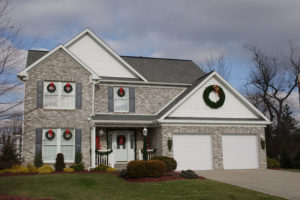There are several things you can do to winterize your home if you’re a snowbird heading south for winter. You can protect your home against theft and water damage while you’re away.
Winterization is the preparation of a property for winter. These preventative measures should be taken in the fall to avoid winter weather. Preventing damage from bursting pipes or other property and home issues can help you avoid them.
Protect Your Home from Appearing Empty:
- Forward your mail and stop newspaper delivery. Ask a friend to come pick up any items left at your house.
- Arrange to have snow removed after storms.
- To discourage prowlers, set timers for motion-sensitive interior and exterior lights. They will come on at different times.
Protect your home from thieves by taking steps:
- Verify that alarm systems have been activated and are in good working order.
- Security-type hinges and deadbolt locks can be used to secure external doors and windows. Slide locks, or equivalent security locks, can be installed on sliding glass doors.
- You can store valuables you don’t want with you in a safe box or another secure location.
- Avoid sharing your travel plans or vacation photos on social media. Then potential thieves could use this information to find out when your house is vacant.
You can help prevent water damage by turning off your water supply:
- It could be very dangerous if a pipe bursts, or leaks while you’re away. If you are going to be away for a long time, it is worth completely shutting off the water supply. Your heating professional can help you determine whether it is safe to shut off your water supply if your home is heated with an older steam heating system. If your home is protected from a fire sprinkler system you should not shut off the water supply.
- After you have shut off your water supply, drain the pipes and open the faucets to drain the water. Flush your toilet to remove any remaining water from the tank or bowl. To prevent water from freezing, you can pour antifreeze into the bowls and tanks of your toilets.
- To complete these steps, you may want to hire a licensed plumber. A plumber can confirm that the pipes are fully drain by blowing compressed air through them.
Keep your home and plumbing warm:
- You can keep your pipes warm by running the furnace if you don’t want to drain them.
- To keep the interior of your floor and walls, which are likely to contain the water pipes, above freezing, set the temperature at 55 degrees F or higher. The ability to keep cabinet doors and rooms open can help heat circulate and warm pipes.
- To avoid water leaks and broken hoses, turn off washing machines and dishwashers when you’re not using them.
- If your boiler is not connected to the heat source, turn off the water supply and heat supply to hot water heaters.
- To prevent freezing water damage, shut off outdoor faucets and drain them.
- Install a low temperature and water flow sensor on your main water supply line. This sensor can be connected to your alarm system or smart phone.
- Wrap water piping with UL-Listed heat tap and insulate if it is exposed to unheated areas like garages, crawl spaces, or attics. Use only thermostatically-controlled heat tape if your water piping is plastic and follow the manufacturer’s installation instructions.
Do routine winter maintenance before you leave:
- Heating system maintenance
- Preventive maintenance is a good idea before you heat your home this winter. This will help prolong the life of your heating system and detect potential problems.
- Before the cold weather hits, have your heating system checked and serviced by licensed professionals. Before you leave, make sure to fill your fuel tanks and set up periodic fuel deliveries if necessary. While you’re gone, have someone monitor your fuel and heat levels.
- Keep the electrical supply on if you need it to run your heating system. A licensed electrician can inspect the main electrical panel, wiring, and outlets of your home to ensure that electrical service is not interrupted while you are away. Replace or repair any defect.
- A licensed contractor should inspect and service your boiler or furnace at least once per year, preferably before heating season starts.
- For forced hot air systems, clean or replace the furnace filter.
- At least once per year, have your chimney inspected and serviced annually by a licensed contractor. Make sure to have creosote buildup from chimneys that serve woodstoves or fireplaces removed.
- Keep your fuel tanks topped up and watch for low levels during winter.
- Your heat should not be lower than 55 degrees because the temperature in the walls where the water pipes are located is cooler than the living areas. To maintain an even temperature, open doors to unoccupied rooms and keep the temperature at the same level throughout the house.
- Follow the manufacturer’s recommendations for maintaining your pellet or wood-burning stoves.
Insulation maintenance:
- Are you sure your insulation is ready to protect you against the cold? It is important to inspect your insulation as it provides protection against winter’s cold winds and freezing temperatures. Do not forget to have your insulation and weather stripping updated before the cold season begins.
- Insulate the attic with additional insulation to prevent ice damming. Heat can heat the roof if it escapes too much. It can also cause ice dams that can lead to water damage and roof collapse.
- Weather stripping can be added around doors and windows to protect against heat loss and drafts.
- If necessary, remove screens from windows and replace them with storm windows.
Winter Safety Measures:
- These are additional safety precautions that you can take to prepare for winter.
- Remove dead branches and trim trees so that they don’t damage your home or injure anyone if they fall due to ice, snow, or wind.
- To ensure melting snow drains properly, keep gutters clean of leaves, sticks, and other debris. Make sure that the downspouts drain water away from your foundation.
- To make them more safe in the snow and ice, repair steps and handrails.
- To ensure that they work properly, check smoke detectors, fire alarms, and carbon monoxide detectors.
- Before you leave, unplug any unnecessary appliances such as your microwave and stove.
Equipment and Supplies Key:
- You might be more prepared for the first snowstorm of the year than you realize. Make sure to stock up on key equipment such as snow blowers or generators before they are needed.
- You should always have snow shovels, a roof rake and snow plows on hand. Make sure you have ice melting compound on hand to melt the ice on walkways.
- Get your snow blower or generator serviced.
- Fuel for snow blowers or generators should be kept in approved safety containers. Keep away from flame-producing devices and heat. Fuel should not be stored in the basement.
Reduce the attraction of pests to your home:
- To discourage potential new residents from moving in, make sure you clean your house thoroughly.
- To prevent mildew, clean, defrost, and unplug fridges and freezers. Wipe them dry, and leave doors propped open. Clean the oven.
- Check your home for any openings that could be used by animals to get in. You should also make sure that your fireplace flue is sealed, as squirrels, birds, and bats can get in through this opening.
- To ensure that there are no serious deficiencies, check weather stripping, insulation, and exterior doors and Windows. These openings can be accessed by water and insects.
- A chimney service should inspect your chimneys and clean them if needed. To prevent infestation, install chimney guard screen-caps.
Prepare for Emergencies:
- Notify the police about the vacant property and give emergency numbers.
- Smoke detectors should be installed on every floor. They should be connected to a continuously monitored fire alarm system, so that emergency personnel can be notified immediately.
- Storm shutters can be installed in coastal or higher wind-exposed areas to secure windows. You may also consider other mitigation measures such as marine plywood 5/8 inch.
- You can ask a friend, relative or neighbor to watch your home and be there in an emergency. Allow them to inspect your home and monitor the electrical, water, and heating systems.
- When it is cold, ask them to inspect the roof’s edge for ice dams. Also look for any leaks. If repairs or service are needed, make sure they have your contact information.
Get the insurance coverage you need. Protect your home while you are away from it, no matter how long or short. To ensure you are covered for any unexpected events while you’re away, contact your Travelers agent or independent agent.
Original Blog: https://www.travelers.com/resources/home/safety/snowbirds-winterize-your-vacant-home



